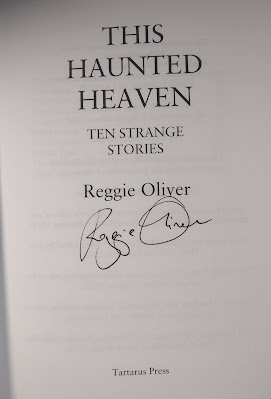First off, a huge thank you to everyone who emailed to check if I was still alive and okay—I can’t tell you how much that meant! This past year has been…well, weird, and not the kind of year I’ll be looking back on fondly. After my sweet spouse's major health scare (all good now, thankfully), my mental health took a severe nosedive for a few months. A much-needed summer trip to upstate South Carolina helped lift my spirits, and at the same time, we both fell in love with the place. We decided that with the Blue Ridge Mountains nearby it would be a perfect place to live, so now it’s been all about getting our house ready to sell. That’s meant sorting through every single thing we own, deciding what stays and what goes, enduring some noisy construction, and doing a bit of sprucing up to make the place basically turnkey. It’s a lot, but we’ll get there!
On to the book now.
9781913766405
Eibonvale, 2025
62 pp
hardcover
I positively lit up when I saw Alexander Zelenyj’s email about his new release, Beware Us Flowers of the Devil. It may be only 62 pages long, but he packs more feeling and vision into those pages than many writers are able to manage in full-length books.
The author notes that his first story, The Boy and the Devil, is a “retelling of an old Norwegian folktale.” In both versions, the boy tricks the Devil into the inside of a nut—but the outcomes diverge in striking ways. It’s a perfect way to kick off the collection, introducing a theme that threads through the other three stories while setting the tone for everything that follows. It's raining fire in the following story, "Joy in a World on Fire" which opens with a boy helping an old man getting rid of "unholy things" brought about by the strange orbs which have decimated life as it once was. The "Plague of Fires" has left "utter devastation" in its wake, including the deaths of the boy's parents. He has a companion now, teaching him how to survive, but he is also troubled by questions that need answers. The old man may have the solution for him, but "it's a dangerous thing." This story, which the author calls "one of the weirder apocalypic stories -- and one of the weirder family dramas" he's written, breaks into three parts, and I believe that's it as far as I'll take this brief synopsis. Such a powerful story, so beautifully written.
 |
| image from "The Lad and the Devil," at The Story Guy, youtube |
Story number three, "There is Only One" is just downright eerie when you stop to consider its implications. For the main character in this one, the confession to his girlfriend of the "really terrible thing (A glorious thing)" he's done is just the beginning, because his life will never be the same as he sets out in search of what he's lost. This story is not only creepy, but is alive with palpable angst tinged with only the smallest sliver of hope. Finally, "Gods and Devils and Those Caught Between" finds two school children preparing to take action against "the Adversary" in order to make him pay after an act of intense cruelty lifts his "veil of artifice" and reveals his true identity. In less than three full pages of text, Zelenyj has crafted a chilling tale in which, as noted at Eibonvale's website, these two do what is needed to "remake the world into the paradise it used to be." This story, in its own way and in my own head, also closes a sort of circle started with the first.
One of the quintessential hallmarks of Zelenyj's prose which I love is his focus on broken people who are searching for meaning in a world which refuses to offer easy answers, landing his subjects in spaces where brutality and tenderness tend to coexist. He has a quiet force to his writing, one that draws out emotion in ways that continue to stay under my skin long after the final page has been turned. Beware Us Flowers of the Devil is another strong example of his unique, haunted imagination—a book that despite its darkness, radiates a strange and unsettling beauty. I read it twice, and I absolutely loved it.
Very highly recommended, as is everything else I've ever read by this author. Thanks, Alex, and a huge thanks to Eibonvale as well.










